| Did you know?
The average human attention span has shrunk to just 8.25 seconds, according to a Microsoft study. That’s less than a goldfish. |
In our fast-paced notification-filled world, where an average person checks their phone 96 times a day (Asurion, 2019), the ability to focus and study effectively is not just a nice-to-have skill. Instead, it is a critical superpower that helps students study effectively.
Whether you’re in high school cramming for finals, a college student juggling multiple assignments or a lifelong learner tackling a new subject, knowing the best study tips for students can make a big difference. It can stop you from feeling overwhelmed and achieving acadmeic excellence.
Furthermore, good study habits go beyond just passing exams. Instead, they can help you understand complex concepts, retain information long-term and reduce stress. Thus, this can make your educational journal more enjoyable and fulfilling.
So, if you are a student, this blog is for you. In this guide, we will walk you through the 100+ best study tips. Come on! Let’s get started!
Why Good Study Habits Matter?

| Fun Fact:
According to a study published in the Journal of Experimental Psychology, students who used proven study methods performed a full grade and a half better on their exams compared to those who used passive techniques like re-reading. |
Effective studying is not just about the number of hours you spend with your books. Instead, it is about how you use that time. Creating effective study tips for students can transform passive reading into active learning. This makes sure that knowledge sticks and you remember the minor detail. Apart from this, they also help you:
- Improve Retention: Following the proper tips can help you ensure you can retain the information for the long term.
- Boost Confidence: Being well-prepared reduces anxiety and builds self-assurance.
- Save Time: Efficient methods mean you learn more in less time. This frees your time for other activities.
- Develop Lifelong skills: Following the effective study methods, develop skills like Discipline, time management, and critical thinking are valuable in any career.
Common Challenges Faced by Students Today
Are you struggling with procrastination or a lack of motivation? Well, you are not alone. According to the study 80% to 95% students struggle to juggle between assignments and personal commitments. That’s all because of procrastination. Many pupils struggle with:
- Focus Issues: Constant distractions from phones, social media and your own wandering mind make it harder to focus.
- Procrastination: The eternal temptation to put off difficult tasks until later, making it harder for them to complete them.
- Lack of Motivation: Feeling burnt out or unsure why you are studying in the first place is also a big problem.
- Ineffective techniques: Using tricks like re-reading notes or highlighting text for hours only to forget everything the next day can be frustrating.
- Poor Time Management: Struggling to balance academics, social life, work, and self-care is also a big problem.
Now that we have accomplished the common challenges students face and why good study habits are essential, come on! Let’s get started with the tips.
Basic & Daily Study Skills Tips for All Students
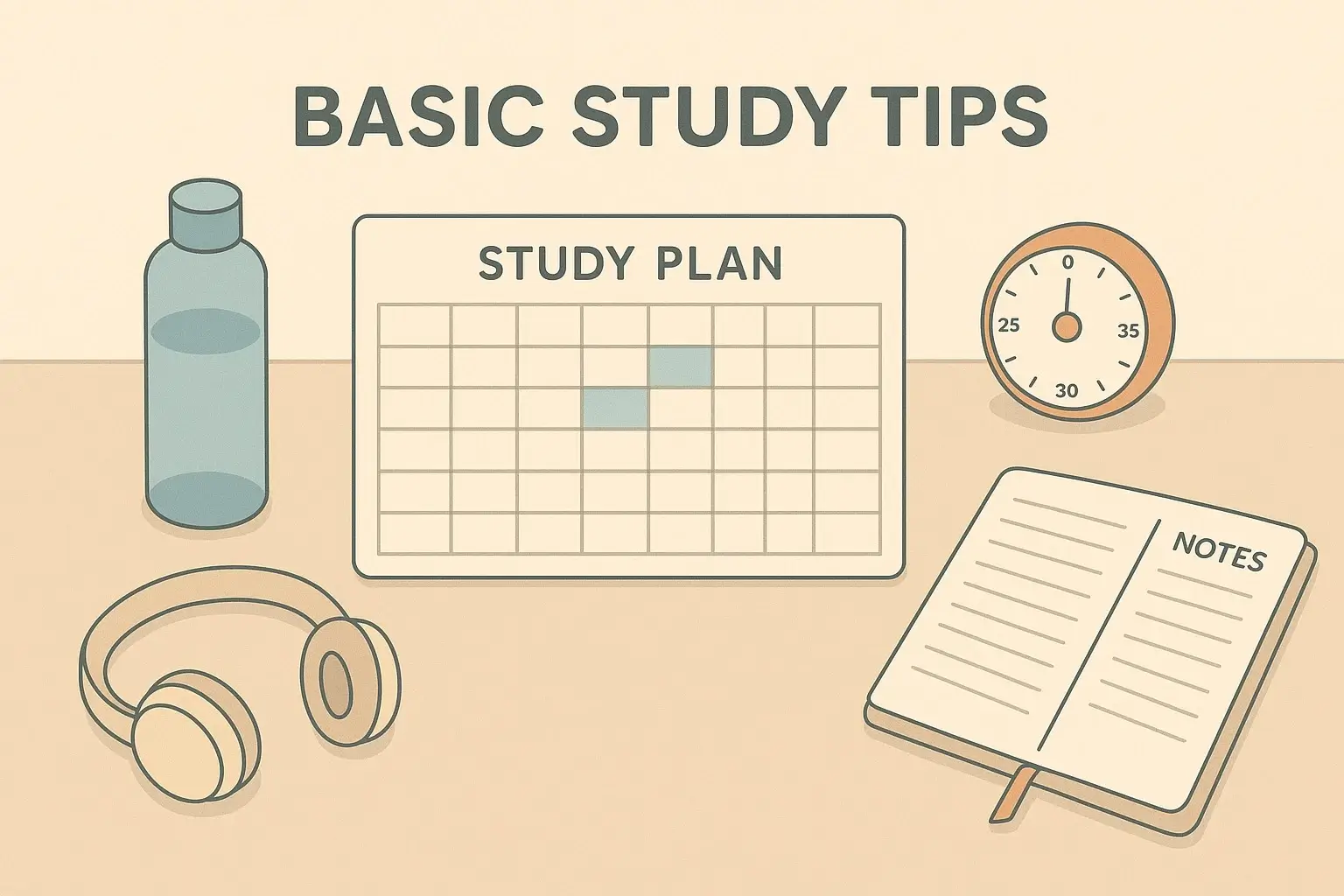
Mastering these fundamental habits will create a strong foundation for all your acadmeic endeavours. These are the core studying tips for students that everyone should know:
Set a Study Schedule
Don’t just study when you feel like it. Instead, schedule it properly. Here are two methods that you need to follow:
1. Time Blocking: Dedicate specific blocks of time in your calendar for each subject. For example, “ Chemistry: 10 AM – 11:30 AM.” Treat these blocks as unbreakable appointments.
2. Pomodoro Technique: This is one of the most powerful smart study tips for students. Study with intense focus for 25 minutes and take a break for 5 minutes. After four cycles, take a longer 15-30 minute break. This prevents burnout and maintains high focus.
If you are having trouble managing your assignment, consider seeking help from Nursing Assignment Helpers UK.
Use Active Recall!
Are you someone who reads, reads and reads?
Stop passively rereading the same thing! Instead:
3. Active Recall: After reading a chapter, close the book and write down or recite everything you remember. Furthermore, use flashcards and practice questions. This will actively stimulate your memory during learning.
4. Spaced Repetition: Review information at increasing intervals over time. Instead of cramming, review notes after one day and then three days later. Afterwards, review after week, etc. Apps like Anki automate this process.
Avoid Multi-tasking
Honestly, it is a myth! Your brain can’t focus on two cognitively demanding tasks at once. When you switch between studying and checking your phone, you lose focus. Also, it takes time to get back on track. Therefore, single-tasking is an effective way to study. Here is what you need to do:
5. Take breaks for better focus, because let’s face it, your brain needs downtime to process information. Instead, get up, stretch, walk around or get some fresh air during your breaks. This is not slacking off. Instead, it is a part of the learning process.
6. According to the study, a healthy brain lives in a healthy body. And sleep is when memory consolidation happens. Therefore, aim for 7-9 hours per night.
7. Don’t neglect your health. Instead, drink plenty of water throughout the day. Make sure you are not dehydrated, as it can cause fatigue. Exercise for even 20 minutes as it can improve blood flow to the brain and boost your mood. Additionally, eat brain foods like nuts, berries, and fish. Avoid heavy, sugary meals before studying.
These daily study tips for students and self study tips for students form the bedrock of academic success. Additionally, consistency with these habits will surely provide remarkable results.
Here’s what some students have to say about it:
“I thought I was bad at Chemistry until I started using active recall,” said Maria, an engineering student. “Just rereading the textbook did nothing. Once, I forced myself to close the book and write out everything I remembered. This helped my test scores go up a full letter grade. It was hard at first, but so worth it.”
Another one said:
“The pomodoro technique has become my lifesaver,” recalled David, a Sophomore. “ I used to get overwhelmed by the thought of studying for three hours. Also, breaking it into 25-minute chunks made it feel manageable. Also, I didn’t pick up my phone while studying because I know a break is coming up.
Also, according to Chloe, a Graduate student:
” Sleep is my secret weapon for effective studying. In my first year, I pulled all-nighters, which backfired on me. However, now I prioritise 7-8 hours. I remember more, think more clearly in class, and my anxiety is so much lower. It feels counterintuitive, but studying less and sleeping more actually made me a better student.
Study Tips by Education Level
Let’s be real! Different stages of education present unique challenges. Here is how to tailor your approach.
From middle school to high school students and college grads, here are some tips for everyone.
Elementary & Middle School Students
At this stage, the goal is to build a positive association with learning. Moreover, developing good habits early on is essential. Here’s how they can make the study time fun:
8. Use visuals, games and hands-on activities. For example, turn multiplication tables into a card game or use building blocks to understand geometry.
9. Furthermore, elementary students have a shorter attention span. Therefore, keep the sessions short. Aim for 15-25 minute focused sessions with plenty of breaks or play.
10. Praise effort and not just results. Remember, a reward chart for completed study sessions can work wonders.
11. Also, let them act out historical events or scientific processes.
12. Parents also play an important role in this. Sit with the students, help them get started and create a consistent routine.
Using these study skills for elementary students and study tips for middle school students can help focus on engagement.
“My kid hates reading flashcards, says the Parent of the 5th grader. “ However, when I turn spelling words into a board game, it is actually fun and he remembers them better.”
“Short bursts are key,” notes a parent of a middle schooler.
“I hate just reading flashcards,” says Liam, a 5th grader. “But when my mom and I turn spelling words into a board game, it’s actually fun, and I remember them better.”
High School Students
As the students proceed to high school, the workload increases and exams become more high-stakes. Hence, the reason why organisation and stress management are the key. Here are some tips and tricks that can help them.
13. Exam week can be stressful. Hence, to manage it effectively, practice mindfulness or deep breathing exercises. Also, remember that your worth is not defined by a single test score.
14. Furthermore, don’t leave the revision for the last minute. Instead, create a revision plan at the start of the unit. It will be way easier for you when you review the material.
15. Group study as well as solo study are the best options. Just make sure to use both effectively. When you want to grasp concepts initially, study on your own. And use group study to quiz each other and explain the topics. This will reinforce your own understanding.
16. Skimming and scanning are good tips. Make sure to develop your reading skills to quickly identify key information in textbooks.
17. Make sure to practice with past papers. This is one of the most helpful study tips for high school students. It helps you familiarise yourself with exam format and question styles.
Here’s what high school students has to say about it:
My revision plan was a game-changer for my A-Levels,” shares Ayra. “I used to just open my notes and hope for the best. Having a plan for what to review each day for a month before the exam made me feel in control and way less panicked.”
“Group study is either a lifesaver or a total waste of time,” says Ben. “ It is only effective if you are prepared. My friends and I have met quite some time before the exam with a specific goal, like working through past paper questions. This helps us avoid chatting about video games for two hours.
Hence, these study tips for high school students are crucial for navigating the increased academic pressures.
College & University Students
Welcome to independence! College life is all about handling everything on your own. Honestly, it is the time when your ability to manage time and learning is truly tested. Here is how you can manage everything and study effectively while still having fun:
18. Since you are the master of your schedule, plan your day effectively. For example, consider using a digital calendar like Google Calendar. Furthermore, block out time for lectures, study, work and socialise while resting properly.
You should also master note-taking systems. There are two that are quite effective:
- Cornell Method: Divide your page into three sections, like notes, cues, including questions and a summary. Thus, this will help you engage with the material during and after class.
- Digital Notes: Moreover, make sure to use apps like Notion, Evernote and OneNote. They are perfect for brainstorming or taking notes on the lecture. Not only are they searchable, easily organised and accessible for any device.
20. Make sure to use campus resources, as you are already paying for them. Don’t hesitate to utilise writing centres, tutoring services, professors’ office hours and the library.
21. Read actively. Don’t just highlight the words. Instead, write questions in the margins, summarise paragraphs in your own words and connect new concepts to what you already know.
22. You have to work on the group assignments. Therefore, choose the study group wisely. Make sure your group members are motivated and focused. Furthermore, set a clear agenda for each meeting to maintain productivity.
Here is what the college students who swear by these tips has to say:
“Going to the support centre was intimidating at first, but it’s the best advice I ever got,” says Jason, a junior. “Not only did the teachers there help me understand the material better, but I built a relationship with my professor that led to a research opportunity.”
“I thought I was a fast typist, so laptop notes were better,” reflects Sophia. “But it wasn’t working for me. I switched to the Cornell method on paper, and it forced me to listen, process, and summarise in real-time. My exam essays are so much stronger because I actually understand the concepts, not just the quotes.”
Hence, these study tips for university students are designed to help them thrive in a self-directed environment.
Study Tips for Specific Academic Fields
Come on! Let’s be real! Different subjects require different approaches. Here are the field-specific study tips for students in demanding majors.
Medical & Nursing Students
Studying medicine is not easy. And since the volume of information is immense, the success hinges on efficient memorisation and application. So, medical students gear up! Here are the best study tips that can make it effective:
23. Master the mnemonics and study tips for students. You can use these mnemonics for lists and processes. For example, use Some Say Marry Money, but my Brother Says Big Brains Matter more” for cranial nerves. Furthermore, combine this with spaced repetition using Anki.
24. Moreover, use 3D anatomy software, physical models and detailed diagrams. Also, drawing structured yourself also proves to be incredibly effective.
25. For Pharmacy students, tackle it systematically. Make sure to group drugs by class, mechanism of action and side effects. Don’t forget to create charts and tables for comparison.
26. Use group discussions for case studies, as discussing the patient cases with peers helps bridge the gap between textbook knowledge and clinical application.
27. Make sure ot always ask why. Understanding the pathophysiology behind a disease makes symptoms and treatments easier to remember.
These study tips for medical students are essential for surviving the rigours of medical school. Let’s hear what students has to say about the pharmacology study tips.
“Anki is the god of medical school,” states Daniel, a second-year med student. “The reading volume is impossible without spaced repetition. I do my Anki cards every single day as I think it is the only way to keep the firehose of information from drowning you.”
Here’s the another one:
“Our study group uses a ‘teach-back’ method,” says Priya, a nursing student. “We each take a patient case and have to explain the pathophysiology, medications, and nursing interventions to the group. Having to teach it forces you to learn it on a much deeper level.”
Engineering Students
Engineering is the field that requires practical application. Hence, rote memorisation won’t work. You need to develop problem-solving habits. Here is how you can do it.
28. Don’t just memorise the formulas. Instead, break them down and understand the derivation and what each variable represents. Furthermore, derive them yourself from fundamental principles.
29. Work on embracing problem-based learning. Practice different problems as it will help you memorise the steps. Also, start with simple ones and gradually increase the difficulty.
30. Learn how to connect theoretical concepts to real-world engineering challenges. This helps understand the material perfectly and even builds intuition.
31. Collaborate with your peers on difficult problems. This will help you learn different approaches and thought processes from your peers.
32. Don’t forget to master your softer tools like MATLAB, AutoCAD, or SolidWorks. Proficiency in them is as essential as theoretical knowledge.
These study tips for engineering students are crucial for developing the analytical mind of an engineer.
Don’t believe us?
Here is what students applying these tips have to say about it:
“You don’t learn engineering by reading; you learn by doing problems,” said Carlos, a mechanical engineering major. “I used to waste time just reviewing lecture notes. Now, I go straight to the problem sets.
Law Students
Studying law is all about reading, reasoning and writing. Hence, you need to process vast amounts of text and extract legal principles. For the students enrolled in law, here are the survival study tips.
33. For every case you read, make sure to create case briefs and structure them properly. This will make it easier for you to review for the exams.
34. Additionally, create visual mind maps to see how different legal concepts, statutes and cases interrelate within a subject like Contract law or Torts.
35. Since law exams are essay based, make sure to practice writing answers under timed conditions. Moreover, focus on applying the law to the facts.
36. You should also participate in study groups, as arguing with your peers sharpens the reasoning.
37. Keep up with the reading so that you don’t get crammed during the exam session.
According to Marvis, a second-year law student:
“Case briefing is tedious, but it’s the grammar of law school. When you start, it takes forever. By the second year, it’s second nature, and you can dissect a case in minutes. It’s the fundamental skill everything else is built on. And analysing it has made it easier for me to study during exams.
Business, Accounting & Economics Students
Here are some amazing study tips for business students looking to survive their exam sessions and studies. They include
38. Don’t just memorise your concepts. Instead, understand them. For example, in economics, understand why supply and demand curves shift. Similarly, in accounting, understand how a transaction affects all three financial statements.
39. Engaging in group discussions and debates on business strategies with classmates deepens your understanding.
40. To learn accounting, you need to work through the problems. Therefore, make sure to practice journal entries, ledgers and full financial statements repeatedly.
41. To become a whiz with a financial calculator and Excel formulas. They are the indispensable tools.
Xavier, a business student says:
“Reading the Wall Street Journal and The Economist changed everything. It let me see the theories from class playing out in real-time. Suddenly, concepts like market saturation and monetary policy weren’t abstract; they were stories. It made studying for case-based exams so much easier.”
Psychology & Science Students
While studying psychology, you need to understand complex systems, theories and research methodologies. Here are some best study tips for psychology students.
42. For psychology, do not just read about a disorder. Instead, actively recall the diagnostic criteria, aetiology and treatment for a specific case study.
43. Furthermore, use acronyms or stories to remember the steps of neurotransmission, the functions of brain lobes, or the order of biological classifications.
44. Focus on research methods and understand how studies are designed. This will help you enhance your research skills and design your one.
45. Additionally, sketch out biological processes, neural pathways or experimental setups. This will help you visualise the information aids memory.
46. Science is collaborative. Hence, working with others on reports helps you learn how to communicate scientific information.
Study Tips for Neurodivergent & Special Students
For students who have ADHD, autism, dyslexia or another learning disability, traditional study advice often falls short. Here are some tailored study tips for students with neurodivergent brains. They include:
47. Break your tasks into smaller chunks and check off each micro-task for a dopamine hit.
48. Visual aids are crucial. Therefore you can use tools like:
- Planners and whiteboards for colour-coding and visual schedules.
- The Pomodoro technique is especially helpful for ADHD. This can make the passage of time more concrete.
49. If you feel overwhelmed, take a break that addresses your sensory needs. This could be listening to music, stretching, using a fidget toy or stepping outside.
50. Optimise your environment like minimising distractions. Use noise-cancelling headphones, study in a clean space and use website blockers. Also, maximise your comfort.
51. Use assistive technology for dyslexia or when focus is low, listen to articles and dictate your notes.
52. Use focus apps like Forest and Freedom. They can help block digital distractions.
53. If you are a kinesthetic learner, pace while you recite information. If you are an auditory learner, record your notes and listen back.
These study tips for ADHD students and with learning disabilities are about working with your brain, not against it.
What students say:
“As a student with ADHD, just focus is the worst advice in the world,” says Alex. “What works for me is body doubling. I either go to the library to be around other people studying, or I do video calls with a friend where we work silently together. The external accountability keeps me on track.”
“My noise-cancelling headphones and white noise app created a bubble of focus I never knew I had,” shares Sam, who is autistic. “Before, every little sound would pull me out of my concentration. Now, I can actually get into a flow state. It’s been revolutionary.”
Study Tips for Online, Distance & International Students
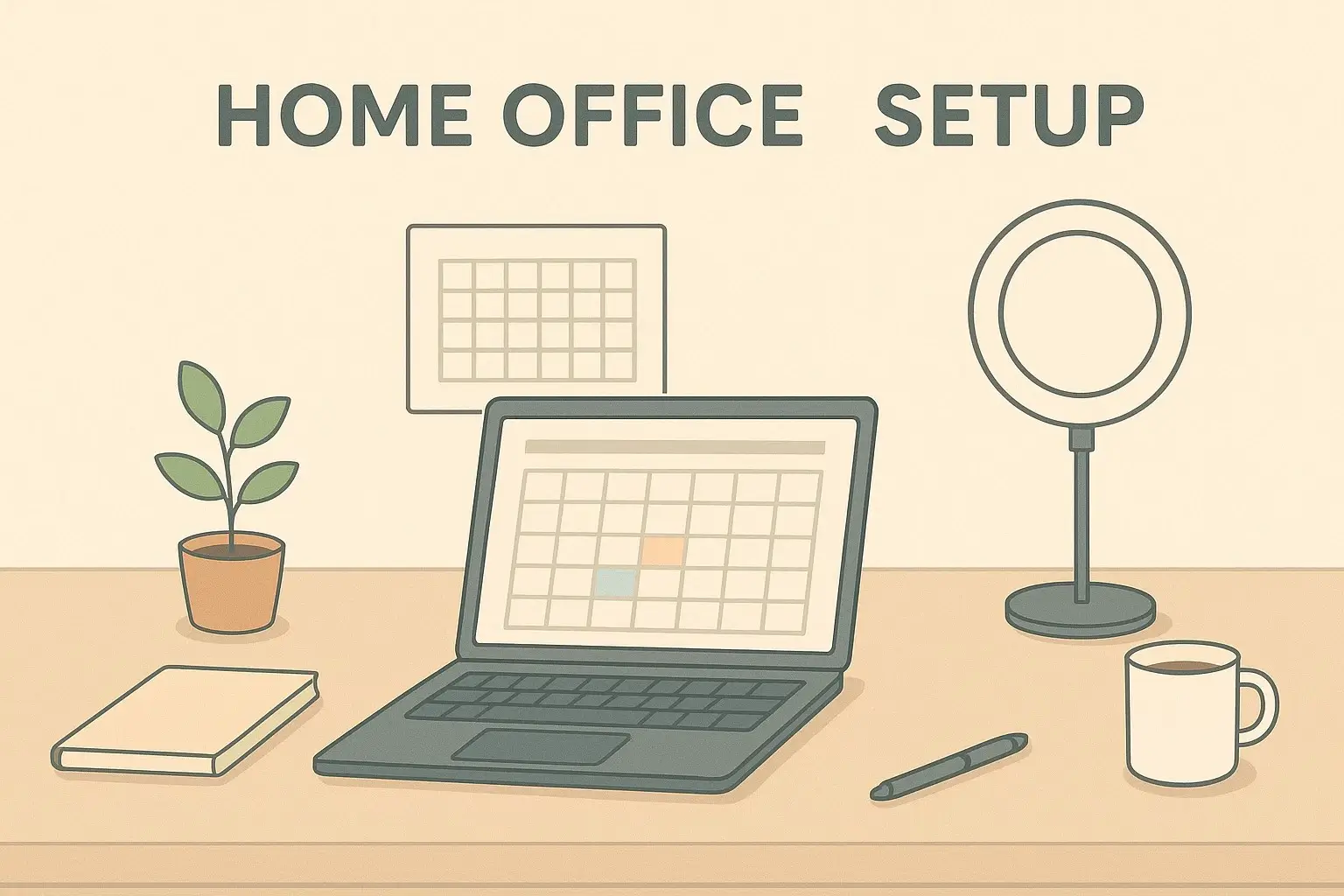
Learning outside the traditional classroom comes with a unique set of challenges, from distraction to isolation. However, by following some tips and tricks, you can study effectively:
Online Students
For the students studying online, discipline and structure are your best friends.
54. Create a dedicated home study space where you can study. This will help your brain switch into work mode.
55. Stay consistent with digital calendars. Schedule everything, including live lectures, self-study time and assignment due dates. Don’t forget to set the reminders.
56. Use website blockers like Cold Turkey or StayFocusd during your study blocks. Also, keeping your phone in another room is a great idea.
57. Actively participate in online forums, as engaging with classmates in discussion boards creates a sense of community and deepens learning.
58. Get dressed for school! This might sound a little silly, but changing out of your pyjamas can put you in a more productive mindset.
International Students
As an international student, you are navigating academic life in a new cultural and linguistic context.
59. Give yourself time to adjust. Furthermore, be patient with yourself as you get used to a new education system, teaching styles and social norms.
60. Learn how to manage time zones and language barriers. Here is how you should do it:
- If you need to contact family in a very different time zone, schedule it so it doesn’t interfere with your prime study hours.
- Furthermore, don;t be afraid to ask people to slow down or repeat themselves. Use subtitles in lectures if available. Also, make sure to record lectures with permission to listen back.
61. International students’ offices are there to help you with everything from visa issues to academic counselling.
62. Build a new support network by joining clubs and societies. Also, schedule regular calls with friends and family back home to combat homesickness.
What students say:
The biggest trap in online school is thinking you can do it from your bed,” warns Hannah, a fully online student. “I set up a small desk in the corner of my room that is for work only. When I sit there, my brain knows it’s time to focus. When I leave, I’m off the clock. That physical separation is everything.”
“I schedule my ‘class time’ even for asynchronous lectures,” explains Ryan. “If I just have a list of videos to ‘watch sometime,’ they never get done. But if my calendar says ‘Watch History Lecture 10 AM-11 AM,’ I do it. You have to create the structure that the program doesn’t give you.”
For the international students looking to study in the UK, read our blog: Complete Guide to Study in the UK
Exam-Focused Study Tips
Exam time is very crucial. These exam study tips for students will help you prepare effectively and perform your best under pressure. Here is what you need to know:
63. Don’t start revising the night before. Instead, create a plan that spreads your revision over several weeks. This allows you to review the older material regularly.
64. Use mock tests and past papers. This is the ultimate form of active recall for exams. Furthermore, it stimulates the exam environment that identifies your weak areas.
65. Teach what you’ve learned by explaining a concept in the simplest terms possible. Any gaps in your understanding will become immediately apparent.
66. Develop mnemonics for last-minute learning, especially for lists or sequences you struggle to remember.
67. Prioritise your sleep and nutrition before the exam as having a well-rested, well-fed brain will perform significantly better than a tired, sugar-crashed one.
68. Avoid all-nighters at any cost.
69. Make sure to back up your exam kit, which includes your ID, pens, pencils, calculator and any permitted materials, ready to go to avoid morning of stress.
What students say:
“The first semester was a huge culture shock, not just academically,” says Chen, studying in the UK from China. “I forced myself to join the badminton club. It was scary, but it gave me friends and a routine outside of studying, which made all the difference for my mental health.”
“I always record my lectures, with permission,” notes Fatima, for whom English is a second language. “In the moment, I can miss things. Listening back later, when I’m less tired, helps me fill in the gaps in my notes. It’s like getting a second chance at the lecture.”
Study Motivation & Overcoming Laziness
Let’s be real! Sometimes you just don’t feel like it. Here are study motivation tips for students to beat procrastination and laziness. Here is what you need do:
70. Start with the 2-minute rule. If a task takes less than two minutes, do it immediately. Furthermore, if a larger task feels daunting, promise yourself you will work on it for two minutes. Sometimes starting is the hardest part and you will find it easier to continue.
71. Find your why and reconnect with your long-term goals. Why are you studying this? To get into a good college? To start a specific career? Write your why down and put it on your wall.
72. You can also partner with your friends to check in on each other’s progress. Knowing someone will ask if you have done the work can be a powerful motivator.
73. Create a reward system and pair studying with something you enjoy. For example, you can say After I finish this chapter, I can watch one episode of my favourite show.” This is a great one of the fun study tips for college students.
74. If you are feeling stuck, move to a different location like a coffee shop, a library or even different location in your house.
75. Even for a study session at home, changing out of sleepwear can shift your mindset from rest to productivity.
76. Focus on the feeling of accomplishment. Remember how good it feels to have completed a rough task. Also, focus on that post-study satisfaction.
Tech & Tools for Smart Studying
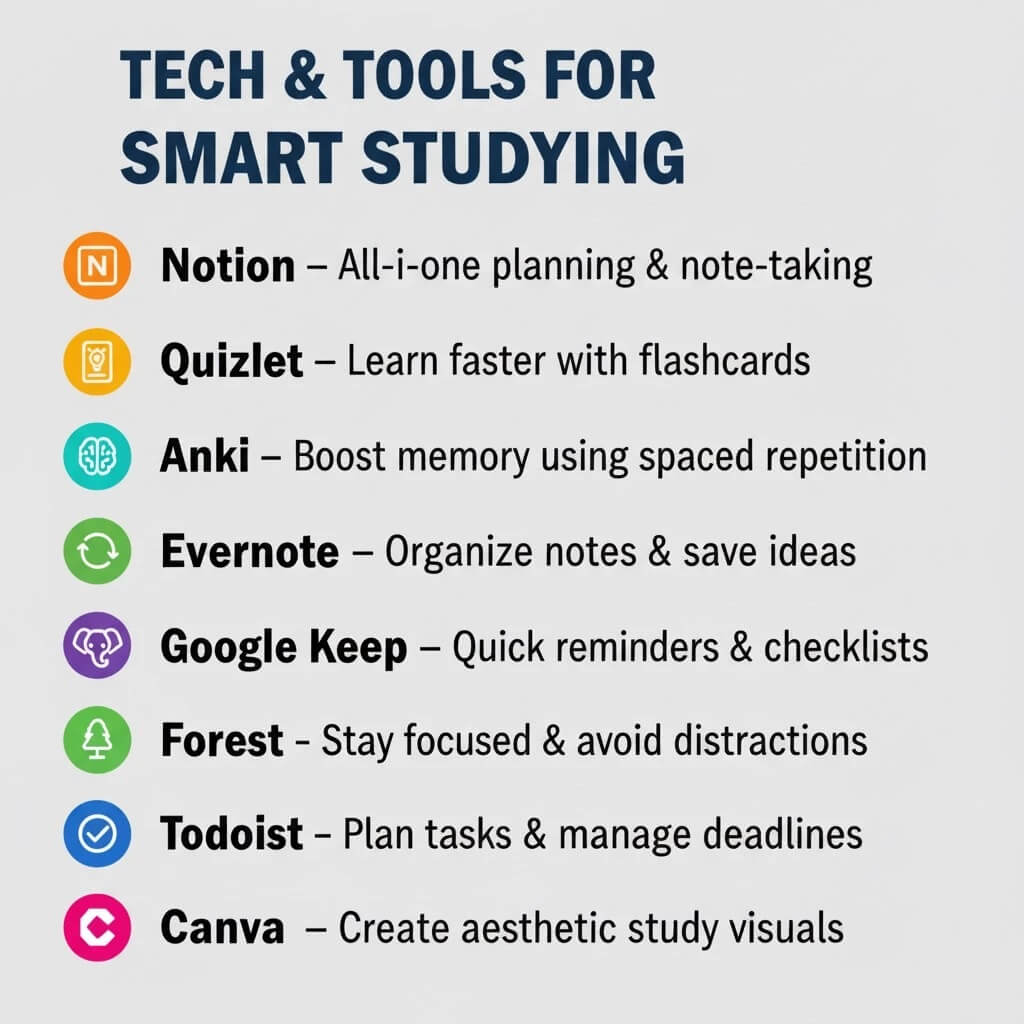
Leverage tech and tools to make your study more efficient. These are the ultimate smart study tips for students along with the apps:
77. Make use of the note-taking apps like:
- Notion: An all-in-one workspace for notes, databases, task lists, and calendars. Incredibly powerful for organizing entire courses.
- Evernote: A classic for capturing notes, web clippings, and audio recordings in a searchable format.
- OneNote: Microsoft’s free, robust note-taking app that mimics a physical notebook, great for handwritten (stylus) notes.
78. Also, flashcard tools are the best options, including;
- Anki: The king of spaced repetition. It’s highly customizable and perfect for memorising large volumes of information (languages, medicine, law).
- Quizlet: User-friendly with great games and test modes. Excellent for quick study sessions and sharing decks with classmates.
79. Focus and Productivity Apps are also best like:
- Forest: Grow a virtual tree while you focus. If you leave the app to check social media, your tree dies. A fun, visual motivator.
- Freedom: Blocks distracting websites and apps across all your devices.
80. If your textbook is not working, find another explanation. Khan Academy. Coursera and YouTube educators can provide that aha moment.
81. Make sure to back up your exam kit, which includes your ID, pens, pencils, calculator and any permitted materials, ready to go to avoid morning of stress.
82. Increase your reading speed to go through the important content fast.
83. Do practice questions after learning a concept to understand it better.
84. What students say:
“The first semester was a huge culture shock, not just academically,” says Chen, studying in the UK from China. “I forced myself to join the badminton club. It was scary, but it gave me friends and a routine outside of studying, which made all the difference for my mental health.”
“I always record my lectures, with permission,” notes Fatima, for whom English is a second language. “In the moment, I can miss things. Listening back later, when I’m less tired, helps me fill in the gaps in my notes. It’s like getting a second chance at the lecture.”
Study Motivation & Overcoming Laziness
Let’s be real! Sometimes you just don’t feel like it. Here are study motivation tips for students to beat procrastination and laziness. Here is what you need do:
85. Start with the 2-minute rule. If a task takes less than two minutes, do it immediately. Furthermore, if a larger task feels daunting, promise yourself you will work on it for two minutes. Sometimes starting is the hardest part and you will find it easier to continue.
86. Find your why and reconnect with your long-term goals. Why are you studying this? To get into a good college? To start a specific career? Write your why down and put it on your wall.
87. You can also partner with your friends to check in on each other’s progress. Knowing someone will ask if you have done the work can be a powerful motivator.
88. Create a reward system and pair studying with something you enjoy. For example, you can say After I finish this chapter, I can watch one episode of my favourite show.” This is a great one of the fun study tips for college students.
89. If you are feeling stuck, move to a different location like a coffee shop, a library or even different location in your house.
90. Even for a study session at home, changing out of sleepwear can shift your mindset from rest to productivity.
91. Focus on the feeling of accomplishment. Remember how good it feels to have completed a rough task. Also, focus on that post-study satisfaction.
Tech & Tools for Smart Studying
Leverage tech and tools to make your study more efficient. These are the ultimate smart study tips for students along with the apps:
92. Make use of the note-taking apps like:
- Notion: An all-in-one workspace for notes, databases, task lists, and calendars. Incredibly powerful for organizing entire courses.
- Evernote: A classic for capturing notes, web clippings, and audio recordings in a searchable format.
- OneNote: Microsoft’s free, robust note-taking app that mimics a physical notebook, great for handwritten (stylus) notes.
93. Also, flashcard tools are the best options, including;
- Anki: The king of spaced repetition. It’s highly customizable and perfect for memorising large volumes of information (languages, medicine, law).
- Quizlet: User-friendly with great games and test modes. Excellent for quick study sessions and sharing decks with classmates.
94. Focus and Productivity Apps are also best like:
- Forest: Grow a virtual tree while you focus. If you leave the app to check social media, your tree dies. A fun, visual motivator.
- Freedom: Blocks distracting websites and apps across all your devices.
95. If your textbook is not working, find another explanation. Khan Academy. Coursera and YouTube educators can provide that aha moment.
96. Use latest AI tools to teach you complex topics.
97. Keep track of your learnings in an app to make it easier to know what remains and what is completed.
98. Use color psychology technique, Try those apps with MCQs or learning method using color psychology.
99. There are apps and websites which help students find out their learning style. Finding out your learning style will make it easier for you to learn quick and effectively.
100. Add more information with what you already know with the help of latest AI tools.
Bonus: Top 10 Study Tips for Every Student
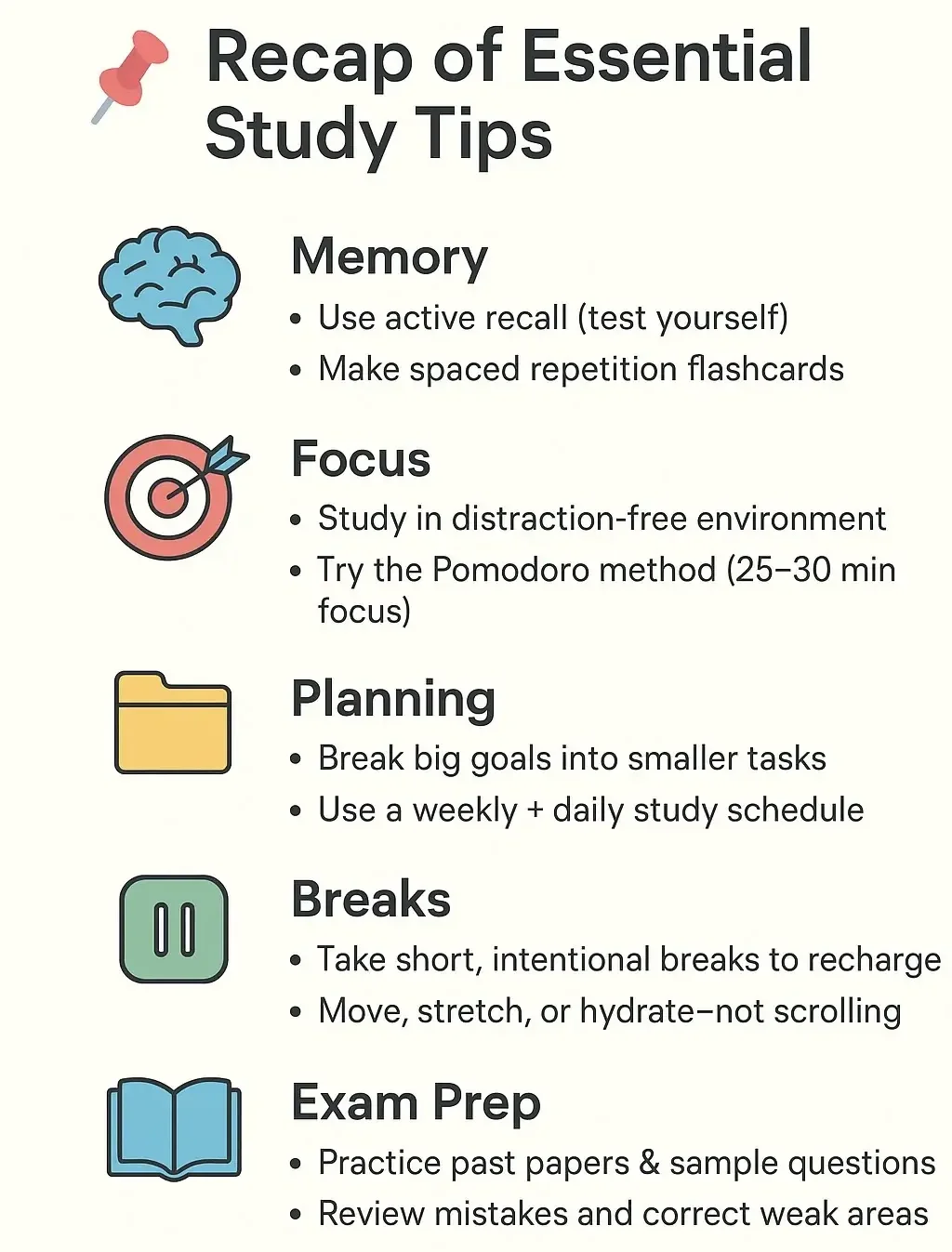
Here is a quick actionable list of the top 10 study tips for students that everyone can start using today. They include:
- Use Active Recall: Test yourself instead of just rereading.
- Implement Spaced Repetition: Review information over time to beat the forgetting curve.
- Follow the Pomodoro Technique: 25 minutes on, 5 minutes off.
- Find Your Ideal Study Environment. Having a place with minimal distractions ensures you can study effectively.
- Get 7-9 Hours of Sleep: Your brain consolidates memories while you sleep.
- Stay Hydrated: Dehydration impairs cognitive function.
- Teach Someone Else: The best way to learn is to teach.
- Practice with Past Exams: Understand the format and style of questions.
- Break Big Tasks into Small Steps: Make large projects manageable.
- Be Kind to Yourself: Take breaks, reward effort, and don’t strive for perfection; instead, strive for progress.
Wrap Up!
This brings us to the end of the guide! Mastering the art of studying is a journey and not a destination. The most important thing is that effective study tips for students are not one-size-fits-all all. Experiment with the strategies in this guide, mix and match them to find the perfect combination that works for you and your unique brain.
Consistency is far more important than perfection. Hence, implementing even a few of these best study tips for students can dramatically improve your focus, retention and overall academic performance while reducing stress. Whether you are an elementary student, a college senior or a professional learner, these studying tips for students are your toolkit for success.
Now stop reading about studying and go put one of these tips into practice.
Frequently Asked Questions (FAQ)
Q. How can I study effectively for exams in a short time?
Ans: While cramming isn’t ideal, if you’re short on time, focus on active recall. Use past papers and practice questions to identify high-yield topics. Create quick mnemonics for key facts and explain the main concepts out loud to yourself or a friend. Prioritize sleep the night before as it’s crucial for memory recall.
Q. What are the best study tips for students who get easily distracted?
Ans: The Pomodoro Technique is your best friend. Also, create a distraction-free zone: put your phone in another room, use website blockers, and wear noise-cancelling headphones. Start with short, focused sessions and gradually increase the time as your focus muscle strengthens.
Q. I’m a lazy student. How do I get motivated to study?
Ans: Reframe “laziness” as a lack of motivation or overwhelm. Use the 2-minute rule to just get started. Break your work into tiny, manageable chunks and reward yourself after completing each one. Find an accountability partner to study with. Remember, action often comes before motivation, not the other way around.
Q. How many hours a day should I study?
Ans: Quality over quantity. 2-3 hours of focused, active studying is far more effective than 8 hours of distracted, passive reading. Listen to your brain. It’s better to study in several shorter blocks throughout the day than in one long, exhausting marathon session.
Q. Are study groups really helpful?
Ans: They can be, if used correctly. A good study group is for testing each other, explaining difficult concepts, and working on problems together. It should not be a social hour. Keep the group small 3-4 people and set a clear agenda for each meeting.
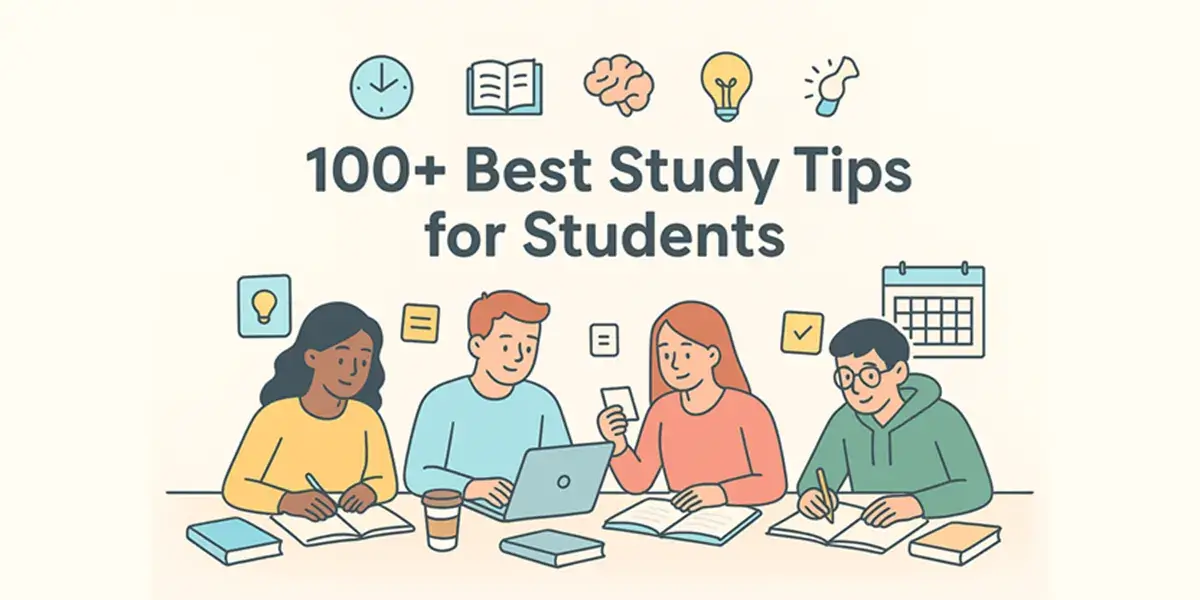



 UK Cities
UK Cities